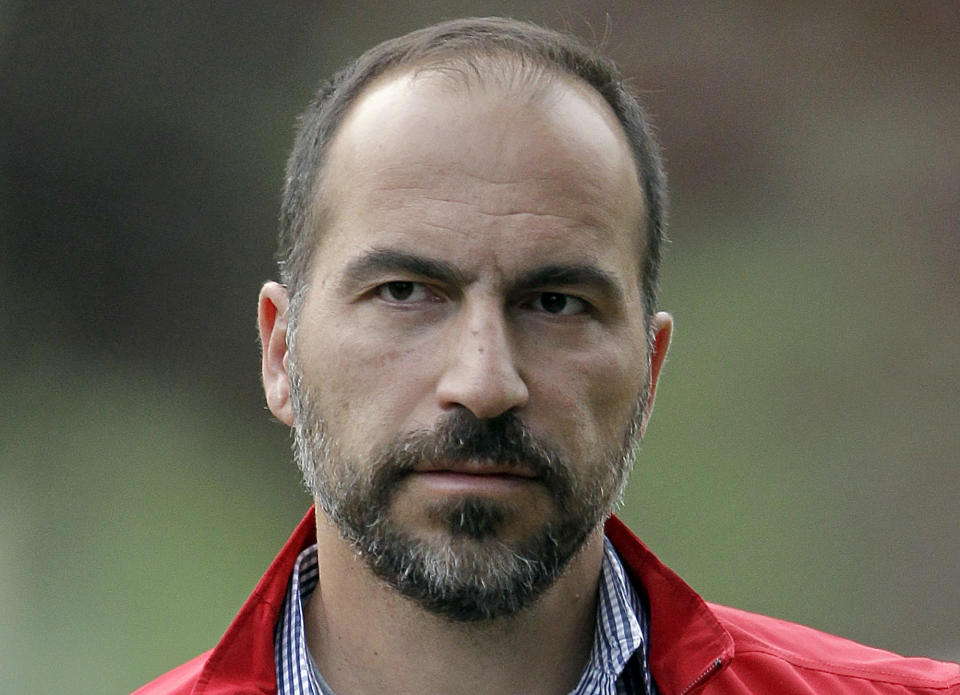Ad agency: Uber only sued us because it didn’t want to pay its bills

Uber on Monday filed a lawsuit Monday claiming digital advertising agency Fetch sold the ride-hailing giant ads that were “nonexistent, nonviewable, or fraudulent advertising.”
Fetch arranged ads for Uber through third-party vendors, and the complaint alleges some of these ads were bogus and designed to game the system to give Fetch and its vendors credit for successful ads.
Uber said it discovered the alleged fraud after it learned its ads were on Breitbart, a site it had blacklisted for advertising. Uber said one Fetch vendor had falsely reported the alt-right site as “Magic_Puzzles.”
Fetch says this isn’t really about fraud
From the other side’s point of view, the matter couldn’t be more different, beginning with Fetch’s claim that the $82.5 million worth of ads Uber paid for were legitimate.
But the advertising company’s position turns the issue on its head: Fetch’s CEO says Uber filed the lawsuit just to obfuscate Uber’s months-long delinquency on advertising bills.
“Fetch terminated its agreement with Uber months ago after Uber stopped paying invoices for services provided by over 50 small business suppliers, engaged by Fetch to place Uber’s mobile advertising,” CEO James Connelly said in a statement.
Uber declined to give a specific response to Connelly’s comments, but reiterated its stated motives.
Fetch was not the only agency Uber stopped paying, although it was the major one, Uber said.
Uber alleges that Fetch’s ads, among other things, were involved with faking clicks to the ads and falsely attributing installs to clicks. In the complaint, Uber points to a high ratio between click rate and low installs as indicative of fraud.
“[The] mobile advertising industry holds that a high reported click rate without corresponding installs is indicative of fraud,” the complaint reads.
Defining quality clicks and downloads
However, documents obtained by Yahoo Finance show that at least some of the agreements between Fetch and Uber used a supercharged version of this ratio to ensure quality. Instead of Uber running up a bill based on clicks and downloads, the company only paid based on downloads and rides, a much stronger metric.
For example, Uber would only have to pay Fetch’s vendors for downloads if they facilitated a certain ratio of downloads-to-first rides, often five-to-one, though dependent on the location. The ride had to be within a week of the download, and had to have a receipt of at least a certain value, a source with direct knowledge of the matter told Yahoo Finance. This was corroborated by documents and emails seen by Yahoo Finance.
Uber acknowledges that not all of the dozens of vendors were illegitimate, and told Yahoo Finance that it is using tools it has developed to identify and pay them.
The company also acknowledges that many of the vendors met Uber’s quality standards in the insertion orders, but says the “click spamming” and other tactics by vendors would game the system and use it to its advantage, attributing organic downloads and new rides to the ads.
To this point, Uber’s suit raises a larger question by claiming that the rate of signups did not fall following the breakup and pause on paying for users. The ride-sharing company maintains that this suggests Fetch’s campaign was in fact ineffective and therefore falsely attributing organic signups to paid placement.
In his statement, however, Fetch’s CEO Connelly stressed that the timing for all of this was suspicious, designed to distract from Uber not paying its bills, and that the company was shocked by the allegations of fraud.
“Following months of non payment, Uber eventually raised unsubstantiated claims relating to ad-fraud as a reason not to pay its invoices, but there is no basis to these claims,” he said, pointing to the gap between withholding payment, Fetch’s firing of Uber as a client, and the subsequent lawsuit. “Fetch not only delivered Uber’s strategic goals, helping it acquire over 37 million new users since 2014, but also achieved an outstanding rating from the client throughout the two-year relationship.”
All of this is playing out based on the nuances of a difficult-to-understand modern ad world that is opaque and largely unnoticed by the public, who interacts and uses with it as much as they breathe. As Fetch told Adweek last year, fraud is a major problem in mobile advertising, and is something industry standards and agreements — like the multiple layers of verification stipulated by Uber’s insertion orders — are designed to prevent.
But is it enough? Is an appropriate amount of fraud prevented? How easily can false positives occur? And what happens if the industry agrees on something but the buyer disagrees, citing proprietary means of fraud detection?
These issues will likely be one of the challenges and growing pains of this modern era of advertising. Or, as Fetch claims, whether the opacity of this modern tech is enough to provide cover for delinquent payments.
“It is unfortunate that Uber would misconstrue facts and use an industry-wide issue as a means of avoiding its contractual obligations,” Connelly said. “We vigorously deny the allegations from Uber and will be responding robustly to ensure we set the record straight.”
Ethan Wolff-Mann is a writer at Yahoo Finance focusing on consumer issues, tech, and personal finance. Follow him on Twitter @ewolffmann. Got a tip? Send to: emann@oath.com.
Read More:
Big bitcoin-friendly companies like Microsoft and Expedia hedge their bet
This website lets you sue Equifax for free without a lawyer with a few clicks
There’s a line in the new Equifax fine print that’s raising eyebrows
The real reason Mexico will never pay for the Trump’s wall: It’d be ‘treason’
How Waffle House’s hurricane response team prepares for disaster
Trump weighs slashing one of the most popular tax deductions
A robot lawyer can fight your parking tickets and much more
Consumer watchdog is making it easier for consumers to sue banks

 Yahoo Finance
Yahoo Finance 